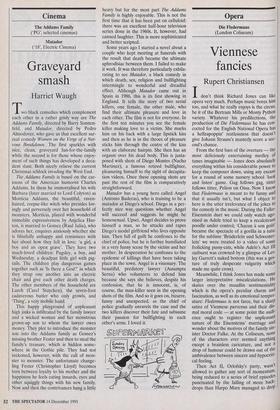Cinema
The Addams Family (PG', selected cinemas) Matador (18', Electric Cinema)
Graveyard smash
Harriet Waugh
Two black comedies which complement each other in a rather grisly way are The Addams Family, directed by Barry Sonnen- feld, and Matador, directed by Pedro Almodover, who gave us that excellent sur- real comedy Women on the Verge of a Ner- vous Breakdown. The first sparkles with nice, clean, graveyard fun-for-the-family while the second is for those whose enjoy- ment of such things has developed a deca- dent siant. Both nicely relieve the current Christmas schlock invading the West End.
The Addams Family is based on the car- toons of the American humorist Charles Addams. In them he immortalised his wife Barbara (later married to Lord Colyton) as Morticia Addams, the beautiful, raven- haired, corpse-like witch who presides lov- ingly and perversely over her household of monsters. Morticia, played with wonderful immobile expressiveness by Anjelica Hus- ton, is married to Gomez (Raul Julia), who adores her, enquires anxiously whether she is blissfully unhappy and reminisces with her about how they fell in love: 'a girl, a boy and an open grave'. They have two much-loved children: Pugsley, a boy, and Wednesday, a deadpan little girl with pig- tails. The children play dangerous games together such as 'Is there a God?' in which they strap one another into an electric chair and give each other death charges. The other members of the household are Lurch (Carel Stuycken), the seven-foot cadaverous butler who only growls, and `Thing', a very mobile hand.
This happy playground of unpleasant high jinks is infiltrated by the family lawyer and a wicked woman and her monstrous grown-up son to whom the lawyer owes money. They plot to introduce the monster son into the Addams family as Gomez's missing brother Fester and then to steal the family's treasure, which is hidden some- where in the Gothic pile. They had not reckoned, however, with the call of mon- ster to monster. The unfortunate change- ling Fester (Christopher Lloyd) becomes torn between loyalty to his mother and the happiness he feels eating innards, eyes and other squiggly things with his new family. Now and then the contrivances hang a little heavy but for the most part The Addams Family is highly enjoyable. This is not the first time that it has been put on celluloid: there was an excellent half-hour television series done in the 1960s. It, however, had canned laughter. This is more sophisticated and better scripted.
Some years ago I started a novel about a couple who kept meeting at funerals with the result that death became the ultimate aphrodisiac between them. I failed to make it work. It was therefore particularly exhila- rating to see Matador, a black comedy in which death, sex, religion and bullfighting intermingle to wonderful and dreadful effect. Although Matador came out in Spain in 1986, this is its first showing in England. It tells the story of two serial killers, one female, the other male, who find their ultimate pleasure and love in each other. The film is not for everyone. In the first ten minutes you see the female killer making love to a victim. She marks him on his back with a large lipstick kiss and then as he is in the throes of pleasure sticks him through the centre of the kiss with an elaborate hairpin. She then has an orgasm over his dead body. This is juxta- posed with shots of Diego Montes (Nacho Martinez), a famous retired bullfighter, pleasuring himself to the sight of decapita- tion videos. Once these opening shots are past the rest of the film is comparatively straightforward.
Matador has a young hero called Angel (Antonio Baderas), who is training to be a matador at Diego's school. Diego in a per- fectly nice way questions whether Angel will succeed and suggests he might be homosexual. Upset, Angel decides to prove himself a man, so he attacks and rapes Diego's model girlfriend who lives opposite him. Then full of guilt he confesses to the chief of police, but he is further humiliated in a very funny scene by the victim and her mother. In desperation he confesses to the epidemic of killings that have been taking place in the town. Angel is a visionary. The beautiful, predatory lawyer (Assumpta Serna) who volunteers to defend him because she says she believes, despite his confession, that he is innocent, is, of course, the man-killer seen in the opening shots of the film. And so it goes on, bizarre, funny and unexpected, as the chief of police gradually unravels the case and the two killers discover their fate and subsume their passion for bullfighting in each other's arms. I loved it.


































































 Previous page
Previous page